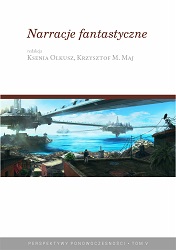O miłości cyborgów w filmach "Uncanny" i "Sight" oraz serialach "Black Mirror" i "Westworld" w świetle wybranych teorii posthumanistycznych
On Cyborgs’ Love in Films "Uncanny" and "Sight" as well as in TV Series "Black Mirror" and "Westworld" in the Light of Selected Posthuman Theories
Author(s): Joanna Łapińska
Subject(s): Philosophy, Visual Arts, Ethics / Practical Philosophy, Aesthetics
Published by: Ośrodek Badawczy Facta Ficta
Keywords: cyborg;cyborgisation;cyborgs;science fiction;science fiction films;science fiction studies;posthuman ethics;
Summary/Abstract: Joanna Łapińska proposes an analysis of several affectionate relationships of contemporary cyborgs in the latest Anglo-Saxon science fiction films and television series. The contemporary cyborg in science fiction cinema is no longer just a hypermasculine “terminator”, a “robocop”, or a ruthless female killing machine like Eve VIII from Eve of Destruction. Cyborgisation is now a much more complex and ambiguous phenomenon and, with progress in biotechnology permeating many areas of life, it raises the question of distinguishing between a “natural human being” and an “artificial” one. Today’s cyborg has become more and more like a human being living in a postmodern or, soon to be, posthuman society. Mankind is now entering into realtionships that are difficult to define and to name with technology. These relatioships include love, intimate and erotic relations. Łapińska looks at the several love relationships of contemporary cyborgs from the science fiction films, Uncanny (2015) and Sight (2012) and the television series, Black Mirror (2011) and Westworld (2016). Her intention is meant to indicate possible ways of interpreting cyborg lovers on screen. In the analysis, she utilizes, therefore, cultural theories emphasizing the breakdown of classical, coherent, humanistic, phallogocentric subjectivity of humans and those attempting to replace this notion with “posthuman” subjectivity—which is inconsistent, dispersed, and relational. These are the most important theories that she recognizes. However, there are others that Łapińska recognizes; the pioneer concept of the cyborg by Donna Haraway, the concept of posthumanism by Rosi Braidotti, as well as select contemporary affection theories. Contemporary science fiction cinema participates in showcasing the departure from the paradigm of humanity as essentially defined by problematizing the issue of emotion/affection as not belonging exclusively to the humans, but possibly to the robot or the cyborg as well. The current envisionment of the cyborg, especially with its edgy and transgressive qualities, is the product of “nature-culture” dichotomy—man and machine living in symbiosis. This will not always be an easy shift in paradigms but it remains unavoidable and undeniable today.
Book: Narracje fantastyczne
- Page Range: 115-136
- Page Count: 22
- Publication Year: 2017
- Language: Polish
- Content File-PDF

